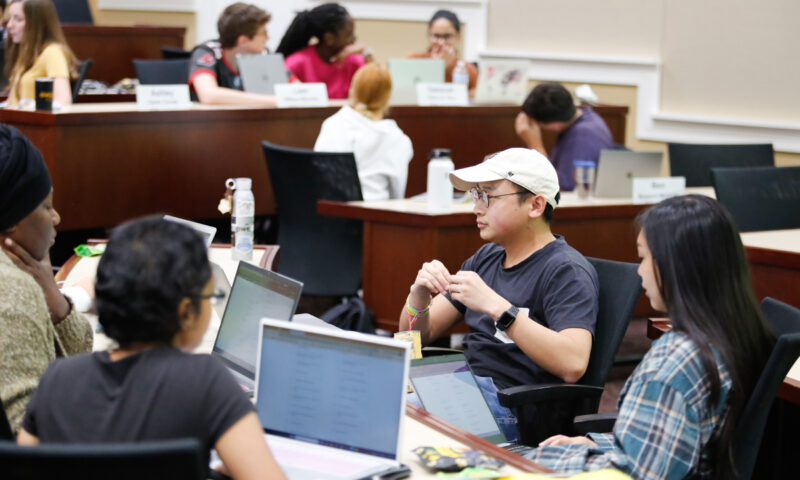In the University of Virginia’s M.S. in Accounting Program, every student takes “Leading for Success in the Accounting Profession” in the fall semester with Program Director and Professor Andrea Roberts. This leadership class goes beyond technical knowledge in accounting and provides us with essential people skills needed to succeed as an accounting professional. This class is one of the most beneficial classes I’ve taken in the program to date because it’s challenging me to grow both as a person and a professional. Here’s how!
It simulates common yet difficult situations one will expect to encounter in the workplace and in the business world.
In every class, Professor Roberts brings up a very common but difficult or uncomfortable situation that everyone will likely encounter in the workplace. Several topics we have covered include how to effectively navigate difficult conversations with coworkers, how to reciprocate in social networking, and how to provide feedback in a meaningful way. The class discussion starts with sharing about a time when we were put into these situations, how we coped with it, and how it went. Professor Roberts then shares professional strategies (and tips based on her own professional experiences) on the best approach to solving these real-life issues. Through the process of reflecting and analyzing how to approach these situations differently, I get a vivid and clear idea of how to effectively solve problems as a professional.
It teaches me useful skills that are critical for success on the job.
We have also acquired useful skills that are essential for success on the job that go beyond my accounting knowledge. The first skill the class taught me is how to communicate effectively. For example, we learned step by step how to draft professional emails for making and responding to work requests and to whom you should write/forward/report a particular problem to in a corporate structure. Another skill I’ve learned is networking. We’ve practiced networking and how to grow our social networks by asking for and offering help to form a meaningful two-way relationship. Finally, I’ve learned how to ask for and provide feedback in a way that will not only benefit my performance, but my team’s performance. Feedback is critical for reflecting on your past actions and directing your future actions.

M.S. in Accounting students in class.
I work in teams to complete in-class workshop activities that put me in real dilemmas and challenge me to find solutions.
In-class workshops are some of the most awesome experiences I’ve had in the program! We are put in real-life dilemmas and have to figure out solutions with our team. For example, we did a team-effectiveness workshop that simulated being trapped in a snowstorm. We had a toolbox of 12 items that we could select from in order to survive, including a flashlight, gun, Swiss Army knife, snow sled, etc. We ranked the 12 items both by ourselves and with the team. Then we compared individual and team results against an expert’s answers. In our class, team scores were often higher and closer to the expert’s scores than individual scores, demonstrating the power of solving complex problems in teams. These workshop activities not only offer us interesting cases to work on with our team, but also bring home the concepts of what makes an effective team.
I have a better idea about my working style and how to maximize my strengths to generate the best team results.
We have taken many personality tests in this class to become more self-aware. Through these tests, I’ve learned what my leading traits are and how my brain operates and processes. We have analyzed our own results to understand how to maximize our traits to bring our best self in both individual work and teamwork. Sharing these test results in our teams has been really helpful in learning about my team members’ working styles and preferences. I’ve experienced firsthand how being more aware of yourself and your peers will help generate better results and positive work dynamics.
I track my learning progress to continue growing.
I also practice my people skills outside of class and track my progress. I write one journal entry each week based on the assignment given in class. One example of a past assignment is a one-on-one networking experience we had to complete with randomly assigned classmates. I had a casual conversation with my classmate over lunch to get to know him/her better. Afterwards, I wrote a reflection on our experiences, our similarities, and what I learned from the person. It was a creative way for me to meet my classmates without feeling awkward.
Learn more about the M.S. in Accounting curriculum and how the program goes beyond the numbers to develop well-rounded business professionals.



